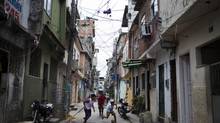by Karl Widerquist | Jun 20, 2014 | Research
Ten years ago, Brazil introduced a radical plan to fight poverty — give cash, every month, directly to mothers. It was self-consciously introduced as a first step toward phasing in an unconditional basic income. In audio segment, the CBC’s Jian Ghomeshi “speaks with Olga Khazan, associate editor for The Atlantic, about the program’s successes and shortcomings, and what it has meant in a country with a checkered history with women’s issues.”
Jian Ghomeshi, “Giving money directly to poor mothers: lessons from Brazil.” Q Blog: CBC Radio, June 10, 2014.

Grandmother Edelice dos Santos and mother Maria Cristina stand before their family in a government-subsized home in Aguas Lindas, Brazil. (Eraldo Peres/AP via CBC Radio)
by Josh Martin | Jun 11, 2014 | News
Zoom hicham, “Recivitas, a Basic Income Experiment Project in Brazil“, YouTube, 25 April 2014.
by Karl Widerquist | May 1, 2014 | Research
SUMMARY: Brazil’s Conditional Cash Transfer program, the Bolsa Familia, was intentionally created as a step toward a basic income. In this article, Carlos Góes discusses the libertarian roots of Conditional Cash Transfer programs and why they work. Carlos Góes, originally from Brazil, is an economic analyst who lives in Washington, DC, where he works in the multilateral sector.
Carlos Góes, “Why Bolsa Familia Works.” No Se Mancha, March 19, 2014.

From No Se Mancha
by Craig Axford | Jan 24, 2014 | Research

The mean streets of Complexo da Mare, a favela in north Rio, where the Bolsa Familia provides social aid to poor families. (Lianne Milton for The Globe and Mail)
[Craig Axford]
This story takes a look at the remarkable changes that have taken place within Brazil since the implementation of the Bolsa Familia grant program ten years ago. According to the article, “Between 2003 and 2009, incomes of the poorest Brazilians grew seven times those of rich citizens.” In addition, school attendance is up and infant mortality has declined significantly.
Stephanie Nolen, “What would Robin Hood do: How cash handouts are remaking lives in Brazil”, Globe and Mail, December 28, 2013
by Karl Widerquist | Jan 14, 2014 | News
[Michael Millar]

Quatinga Velho
The Cologne Basic Income Initiative provides funds for residents of Quatinga Velho in São Paulo , Brazil. The village’s population of 127 has received the unconditional basic income of 132 EUR for four years, with the money being used to improve their accommodation, provide healthcare and income-generating activities. The extra donations will expand the project by around 100 people.
For more information or to donate, see the following link:
Kölner Initiative Grundeinkommen,”BGE-Spendenmarathon 2013: Hilfe für Quatinga Velho [BGE Fundraising Marathon 2013: Help for Quatinga Velho]”, Alvarum, posted January 6 2014: www.alvarum.com/quatinga-velho





